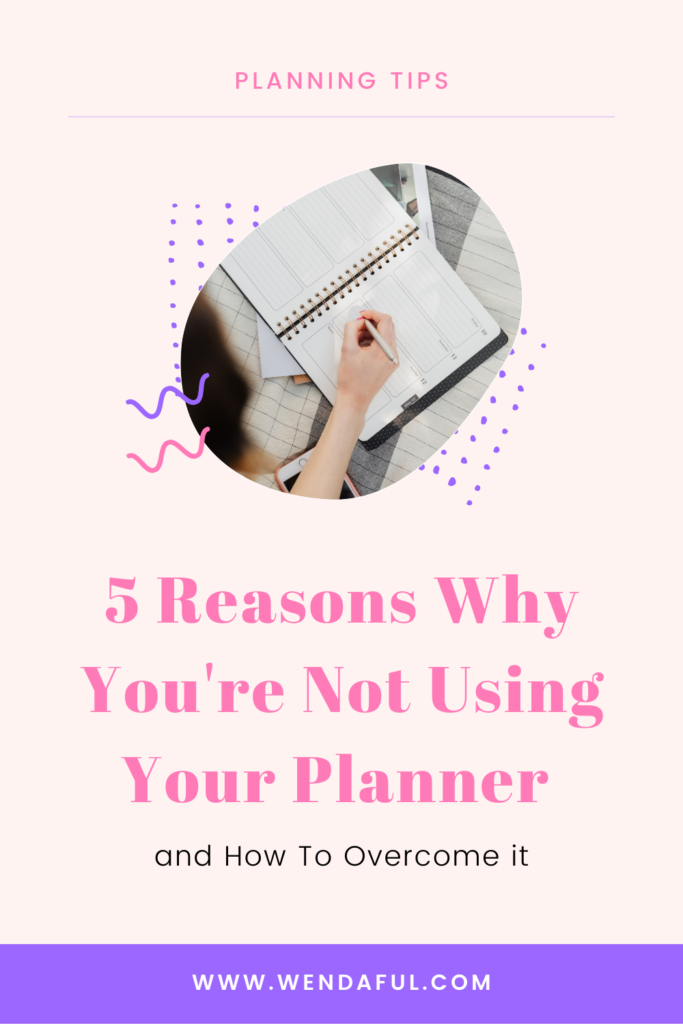It’s a new year and you just bought a brand new planner. However two weeks later, you already quit. Sound familiar? If you’re like most people you probably have already stopped using your new planner that you were so excited about. Perhaps you didn’t know how to effectively use it, or maybe you just didn’t have the time to update it regularly. If you’re having trouble with sticking to your planner here are the top 5 reasons why most you’re not using your planner and how you can overcome it.
Table of Contents
1. You’re being a perfectionist
You want your planner to look like everyone else’s on Instagram, and when it doesn’t you quit. It can be difficult to break the habit of perfectionism, but it’s important to do so if you want to be successful with planning. Here are some reasons why you might be a perfectionist when it comes to your planners:
- 1. You feel like you have to write perfectly all the time and if you can’t then you won’t write in it all.
- 2. You feel like you can’t make mistakes and if you do the planner is over for you.
- 3. You feel like you need all the markers, stickers and accessories in order to make the planner work for you.
- 4. You feel like if it doesn’t have a specific layout you want then the whole planner is useless.
- 5. You feel like if you don’t have enough plans to write in it then you shouldn’t write in it all
You should make using your planner enjoyable and something you do every day, even on days when you don’t want to. If you’re trying to make your planner look perfect, you’re more likely to give up before you even start.
Instead, try to keep things easy and allow your planner to get a little messy.
2. It’s too complicated
There are many planners available on the market, some with lots of features like a habit tracker, goal planner, mood or sleep trackers, health and fitness trackers, and more! However, if these features become too complicated or time-consuming to keep up with on a daily basis, you are less likely to stick with using the planner. It is important to find a simple daily planner at first that does not require too much commitment. If you find you need to add a habit tracker or other tracker later on, you can do so yourself.
I have a simple digital planner for you here:
Digital Prioritized Daily Planner Page | GoodNotes Apps, NoteShelf
3. You think you can remember things in your head
If you’re like most people, you think you can remember things in your head. But is that really the case? Studies have shown that humans can only remember about 7 items at a time and that the more complex the information, the less we can remember. This is why it’s so important to use a planner to keep track of your schedule and commitments. Not only will this help you stay on track, but it will also give you context so that you can better understand what’s going on. So try using your planner as your inbox and writing every little thing down in your planner!
4. Planning takes too much time
You may stop planning when you think it requires you to check it and write in it for hours a day. But if you know how to properly use a planner, it shouldn’t take no more than 15 minutes.
If you plan your day, you will save time in the long run. Try to make an appointment with yourself every day to plan out your day. Write down what you need to get done tomorrow. Forget all the other things like goal planning, habit tracking or sleep tracking for now. If you really only have so much time, try just making a list for tomorrow.
5. You’re using too many other systems in your life
If you’re like most people, you use more than one system to manage your life. You have a calendar, a to-do list, and a note-taking system, for example. But is this really the best way to manage your time?
The problem with using multiple systems is that they’re not always synced up. If you have a work planner that only shows your work appointments and try to schedule a birthday party on the weekend you might miss that you also have a soccer game that weekend.
Another problem with using multiple systems is that they can be confusing. You might not know which planner or notebook to turn to for your kid’s school ID#, or when your next optometrist appointment is. The problem with multiple calendars, apps, and notebooks is that we start to forget what information lives where and if we don’t check or update them regularly then we start not using it at all and things start falling through the cracks.
In order to be more organized, you need to be more intentional about where all your information goes. The fewer systems there are, the less there is to juggle. You really only need one calendar and one planner to capture everything in your life. If you can, eliminate any unnecessary apps, calendars, notebooks, or planners.
Learn how to stay consistent with using your planners by reading more here: 5 Ways to Stay Consistent in Your Planner
Now that you know the reasons why you stopped using your planner you can use these tips to help you overcome it and get organized this year instead.

